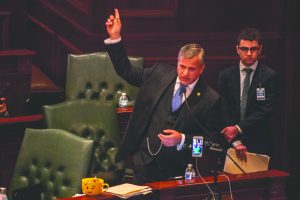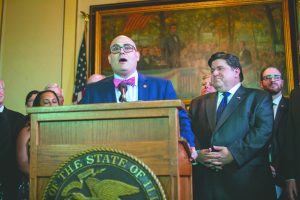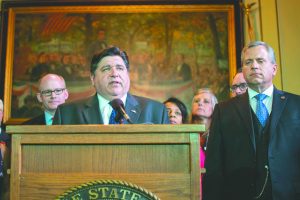Illinois House sends graduated tax question to voters
By Jerry Nowicki Capitol News Illinois — May 31, 2019
Rep. Robert Martwick, D-Chicago, gestures while speaking on the House floor Monday during debate about the graduated income tax amendment proposal he sponsored. (Photo by Jerry Nowicki/Capitol News Illinois)
SPRINGFIELD — A constitutional amendment that would allow the General Assembly to set higher tax rates on greater amounts of income passed its last legislative hurdle May 27 and will head to the voters for final approval about 18 months from now.
After more than three hours of debate in which all 44 House Republicans spoke on the floor, the vote cleared its constitutionally mandated three-fifths majority by two votes. All 73 representatives voting in favor were Democrats.
While Democratic Gov. J.B. Pritzker played no formal role in the legislative process to put the amendment on the ballot, at least one Democrat who previously said he would vote against the bill credited the governor for his sudden switch.
“I was a very vocal critic about this, obviously, I came out with some concerns,” Rep. Jonathan Carroll, a Northbrook Democrat, said. “… Gov. Pritzker reached out to me right away, had some conversations with me and heard that my issue is property taxes.
“Along with his help and the help of my colleagues in the House and the Senate, we’re going to form a property tax task force to review how we tax in Illinois for property taxes and make sure that we do it better and we do it right.”
The state does not levy or collect property taxes in Illinois; only local taxing bodies such as school boards, municipal governments and counties have that authority. The largest contributor to most local tax bills are K-12 schools, which for years have faced funding shortfalls and proration from insufficient revenues provided by the state.
Still, Carroll and Rep. Sam Yingling — a Grayslake Democrat who also said at one time he would vote against the graduated tax — said state action is needed to overhaul the property tax system and the graduated tax is part of that process.
“The current system does not work and we all know that,” Yingling said in his floor speech. “The process of property tax restructuring will not be easy. But I submit that that process begins today.”
Republicans, however, were more skeptical of any actual tax relief coming from the bill, and House Minority Leader Jim Durkin (R-Western Springs) accused the governor of “horse trading” in order to get the 73 votes in favor.
“Let’s make no mistake. Today’s vote is the end result of the Illinois Democrats’ historical, ravenous, irresponsible budgeting and spending,” Durkin said. “However it was also clear that today’s vote was a fait accompli. It’s a foregone conclusion.

Rep. Jonathan Carroll said during Monday, May 27 news conference in the governor’s mansion in Springfield that Gov. J.B. Pritzker approached him soon after learning of Carroll’s concerns with the graduated income tax amendment. “I was a very vocal critic about this, obviously, I came out with some concerns,” the Northbrook Democrat said. “… Governor Pritzker reached out to me right away, had some conversations with me and heard that my issue is property taxes.” (Photo by Jerry Nowicki/Capitol News Illinois)
“I know how this bill went down. I know how this amendment went down. And please, don’t think that there wasn’t any horse trading to get these votes. I know better, you know better, we know better.”
Senate Joint Resolution Constitutional Amendment 1’s passage means the voters, in November 2020, will be given the opportunity to decide whether the state can have the authority to set graduated tax rates. Either 60% of those voting on the question or the majority of those voting in the election will have to support the measure for it to become law.
While Pritzker’s political capital helped guide the measure through the Legislature, his financial capital is expected to play an outsized role in the media campaign for its passage.
The billionaire is an admitted donor to the dark money group Think Big Illinois, a 501(c)4 organization that has already sustained months of advertising efforts in favor of the graduated income tax the governor has dubbed the “fair tax.”
For the next 18 months, Think Big will likely be joined on the air by two other dark money groups on the other side of the issue: Illinois Policy, the advocacy wing of conservative think tank Illinois Policy Institute, and Ideas Illinois, a business-backed group which has aligned itself against the tax.
These groups have dubbed Pritzker’s marquee initiative a “jobs tax,” a “blank check” to lawmakers and an “unfair tax.”
The rhetoric of each side was matched on the House floor Monday and mirrored that of the Statehouse debate that has been ongoing since March.
Democrats said added funding is needed to pay down debts and prevent ongoing cuts to

Gov. J.B. Pritzker speaks during a news conference Monday in the governor’s office in Springfield following the House passage of a joint resolution that will put a graduated income tax amendment on the 2020 general election ballot. (Photo by Jerry Nowicki/Capitol News Illinois)
education and programs designed to help the state’s neediest populations.
“We’ve made year-after-year cuts to budgets like DCFS (Department of Children and Family Services), and now you have children dying because you have case workers that are overburdened and underpaid,” Rep. Rob Martwick, a Chicago Democrat and the bill’s sponsor, said. “So what are the solutions to these problems? The solutions are to eliminate our deficits, eliminate that structural deficit. When you do that, you start to right the ship. You can fund education, you can pay down debts.”
The options to do so, Martwick said, were to raise the state’s flat tax from 4.95% to 6.5% or higher, or to raise the $3.5 billion anticipated to come from the graduated rates.
Republicans said the bill more likely provided incentive for the state’s wealthiest taxpayers and job creators to leave, and warned that no matter what rates are approved by this Legislature, they can be raised in the future.
“The graduated tax will give Springfield the ability to raise taxes on whoever they want by manipulating rates and brackets,” Rep. Lindsay Parkhurst, a Kankakee Republican, said. “The result will be an increase on the middle class. We cannot trust Springfield with any more of our money without real structural reforms to our state government and our political system.”
Jnowicki@capitolnewsillinois.com



